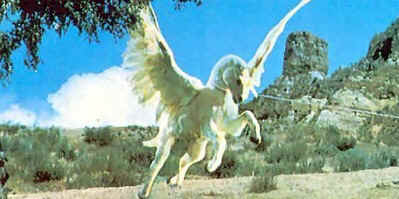
BELLEROPHON
Real
Name: Hipponous
Occupation:
Vagrant, former monarch, former adventurer
Legal
Status: Exiled Citizen of
Ephyra
Identity:
The general populace of Earth is unaware of the existence of Bellerophon except
as a character from myth.
Other
Aliases: The name
“Bellerophon” translates as “Bellerus-Killer.”
Place
of Birth: Ephyra (modern
Corinth, Greece)
Place
of Death: Iolcus (now part of
modern Greece)
Marital
Status: Separated
Known
Relatives: Poseidon,
(alleged father), Eurymeda (Eurynome) (mother), Glaucus (alleged foster
father), Philonoe (wife), Isander, Hippolochus (sons), Laodameia, Deidameia
(daughters), Iobates (father-in-law), Stheneboea (sister-in-law)
Group
Affiliation: None
Base
of Operations: Lycia, formerly
Ephyra, Greece in the 14th century
First
Appearance: (historical)
Adventure Comics #163, (recent) Xena: Warrior Princess #0
History:
Bellerophon is the son of King Glaucus of Ephyra, and Eurymeda, the daughter of
King Nisus of Megara. According to some accounts, Eurymeda had already been
seduced by the sea-god, Poseidon,
when Glaucus took her as his wife. She named their child “Hipponous,” but
most accounts consider him a son of Glaucus.
As
an adult, Hipponous sought the hand of Aethra, the daughter of King Pittheus of
Troezen, as his bride. In his desire for her, he entered into a feud with
Bellerus, his cousin, and the two quarreled, Bellerophon murdering him out of
ego. He earned the name “Bellerophon'' as a result, and was exiled from Ephyra.
In his absence, Aethra, became the wife of King Aegeus of Athena, and mother of
the future hero, Theseus
Banished
from Corinth, Bellerophon traveled south to Tiryns, where he sought attention
from King Proetus in order to be purified from the murder of Bellerus. Proetus
absolved him of the crime, but his wife, Stheneboea, became attracted to
Bellerophon and attempted to seduce him. He resisted her advances, but
Stheneboea did not take the slight with honor, and instead falsely claimed the
young man had attempted to seduce her. Unable to punish a man he had just
absolved of murder, Proetus sent Bellerophon to deliver a message to his
father-in-law, King Iobates of Lycia, in the east. Unknown to him, the message
was asking King Iobates to dispose of Bellerophon where he could not.
When
Bellerophon arrived in Lycia, he was warmly welcomed by King Iobates and allowed
to stay as his honored guest. Nine days after his arrival, King Iobates finally
read the message and realized he had the same problem as King Proetus in that he
could not murder a stranger on whom he had shown great hospitality. Instead, he
sent Bellerophon on a foolish quest to slay the Chimera,
a monstrous creature that terrorized the mountains west of Lycia and devoured
travelers and cattle.
Uncertain
how to confront such a dangerous creature, Bellerophon traveled to the seer
Polyeidus for advice. The seer told him to go to the Temple of Athena, and while
sleeping in the temple overnight, Athena appeared to him. Sent by Poseidon, the
patron god of Corinth, she showed him the plain of Mount Helicon where the
winged horse Pegasus dwelled and left him a golden bridle to tame the horse.
After making a sacrifice to both Athena and Poseidon, Bellerophon traveled to
Thebes and Mount Helicon, where he found Pegasus drinking from the Peirene, a
local stream. Joined by a small retinue of Lycian soldiers, he managed to
confront Pegasus and get the bridle on her, claiming the winged horse as his
own.
With
Pegasus as his steed, Bellerophon was able to confront the Chimera at Mount
Olympos, where Pegasus’s speed and grace allowed him to elude its fiery
breath. Unable to pierce its hide with weapons, he shot lead-tipped arrows down
the creature’s throat where the melting lead poisoned the beast and killed it.
With
Lycia now indebted to Bellerophon, King Iobates now struggled to rid himself of
his unwanted house guest. He sent him on a mission to conquer the Solymi, their
enemies to the east, and to repel the invading Amazons from the north, but armed
with Pegasus, Bellerophon met and defeated both challenges. Now indebted to him
as well, he ended up awarding Bellerophon with half of his kingdom and the hand
of his daughter, Iphinoe, Stheneboea’s sister, in marriage. The two of them
had two sons, Isander and Hippolochus and Laodameia and Deidameia. Hearing this
news, Stheneboea reportedly took her own life, but according to another story,
possibly apocryphal, Bellerophon avenged himself on Stheneboea by giving her a
ride on Pegasus and then pushed her off at a great height.
Upon
the death of King Iobates, Bellerophon gained the throne of Lycia, and according
to another story, repelled the armies of jealous King Proetus trying to claim it
for himself. Despite the respect and adoration of the Lycians, Bellerophon
developed a life lacking in fulfillment and started looking for avenues to
burgeon his failing spirits. Growing envious of the gods who had favored him, he
took Pegasus and flew to Thessaly to join the gods on Olympus, but Zeus, King of
the Olympian gods, angered by his presumption, sent a stinging insect to attack
Pegasus. Stung by the gadfly, Pegasus buckled, and Bellerophon fell into the
Penaeus River.
In
his absence, Bellerophon’s son, Isander, inherited the throne of Lycia, but
Bellerophon, crippled by his fall, wandered as a lame beggar for several years.
Ignored since he had been shunned by the gods, he reportedly died alone near
Iolcus and was buried without proper rites or anyone to record his fate.
Height: 6’2”
Weight: 185 lbs.
Eyes: Blue
Hair: Brown
Strength
Level:
Bellerophon possesses the normal human strength level of a man of his size,
weight and build who engages in extensive physical activities.
Known
Superhuman Powers:
None
Abilities:
Bellerophon is an accomplished athlete, warrior and fighter trained in unarmed
combat, swordsmanship and the bow and arrow.
 Pets/Transportation:
Bellerophon once owned Pegasus, a white winged horse which
according to myths sprang from the decapitated corpse of Medusa,
one of the Gorgons. In some accounts, it has often been claimed that Pegasus was
the off-spring of Medusa and Poseidon, the sea-god, who had been her lover
millennia before. A separate predisposition is that Pegasus is the reincarnation
of Medusa, having been freed of her curse and becoming a pure being in the form
of a horse. By either account, Pegasus is obviously a mystical creature and of
divine lineage.
Pets/Transportation:
Bellerophon once owned Pegasus, a white winged horse which
according to myths sprang from the decapitated corpse of Medusa,
one of the Gorgons. In some accounts, it has often been claimed that Pegasus was
the off-spring of Medusa and Poseidon, the sea-god, who had been her lover
millennia before. A separate predisposition is that Pegasus is the reincarnation
of Medusa, having been freed of her curse and becoming a pure being in the form
of a horse. By either account, Pegasus is obviously a mystical creature and of
divine lineage.
Pegasus
was endowed with wings connected to her shoulder blades which were fully
feathered like that of a bird. Measuring a wingspan of almost twenty-five feet,
she could fly and cover great distances, covering distances of 500 hundred miles
as when she carried Bellerophon from Lycia to Thessaly. This range would confirm
she is possibly bolstered by the same similar divine energies as the Olympian
gods, granting her an almost inexhaustible stamina and physique to cover such
distances. It is unknown as to how high an altitude she could achieve before
reaching a level where Bellerophon would be unable to breath. Her general
cruising speed might be no more than 70 mph with a nominal height of no more
than 200 to 250 feet. She was also exceptionally graceful and capable of eluding
obstacles like mountains and towers and creating acrobatic maneuvers allowing
Bellerophon to elude and avoid attacks.
Comments:
Bellerophon only appears in Marvel or DC Comics except in very minor references.
This bio also includes details from Pegasus’s appearance in DC Comics; it is
unknown if Pegasus has appeared in Marvel Comics.
Some
sources erroneously claim Pegasus once belonged to Perseus (Clash of the Titans
- 1981) or Hercules (Disney’s Hercules-1998).
Clarifications:
Bellerophon is not to be confused with:
Last updated: 12/02/23